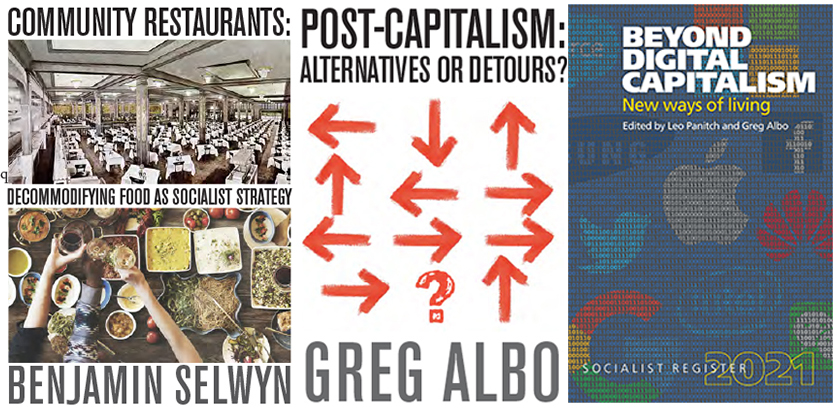
- This event has passed.
Dual Presentation: Community Restaurants with Benjamin Selwyn / Postcapitalism: Alternatives or Detour?
Sun, May 2, 2021 @ 2:00 PM - 4:30 PM
$7 – $11
Community Restaurants: Decommodifying Food as Socialist Strategy with Benjamin Selwyn
The outbreak of Covid-19 has exacerbated many of the system’s worst aspects. In the UK, the birthplace of free wage-labor based capitalist agriculture, the pandemic has exacerbated existing food inequities. The pandemic has stimulated discussions about how to remedy the world’s corporate-dominated food system. The most popular alternative visions propose shifting production and consumption away from meat increasingly to plant-based diets produced according to agro-ecological principles. While these approaches could be part of a broader solution, until now they have tended to eschew explaining the food system’s inequities in class-relational terms.
This essay argues that the root problems of the contemporary food system are three-fold: (1) it is rooted in, and depends upon, the commodification of labour, food, and natural resources
(including land); (2) that these commodities are subordinate to capitalism’s endless drive of exploitation-based accumulation; and (3) that the food system itself incorporates, and
contributes to reproducing, these dynamics throughout the wider capitalist system. Facilitating healthy, increasingly plant-based diets should be part and parcel of a socialist agenda.
What might an emergent alternative food system look like? How could it decommodify food inorder to reduce working class market dependence while enhancing working class health? How could it increase workers’ democratic control over its production, distribution and consumption? How could it reduce race and gender inequalities? How could the construction of such an alternative system facilitate political alliance building amongst oppressed and exploited groups? How could it enable workers’ organizations to encroach upon the power of capital? This essay suggests that community restaurants, serving free and cheap food, represent a socialist demand that can fulfil the above criteria
Post-Capitalism: Alternatives or Detours? with Greg Albo
The main political reference points in opposition to neoliberalism today – the constituent organizations of the Party of the European Left, the platforms associated with the left coalitional Iberian governments, the policy proposals that emerged from the British Labour Party under the leadership of Jeremy Corbyn, and the Bernie Sanders candidacy in the Democratic Party presidential primaries – converge in a common rejection of social democracy's political cynicism and economic agenda seeking a return to one or another variant of competitive corporatism. The characteristic programme has been along the lines of the annual Euro-Memorandum: an anti-austerity, ‘Keynes-plus’ reversal of the economic policy regime of neoliberalism, recalling the alternative economic strategies of the 1970s, but now set within a far less ambitious transitional policy matrix.
There is, however, deep-seated scepticism toward any of these agendas among many of the most militant opponents of neoliberalism, who have insisted on the importance of advancing a postcapitalist’ future. For them, the necessary break from neoliberalism is too sharp, and the disintegration of the historical institutions of the left too severe, for a rehabilitation – at
whatever scale of intervention – of a more egalitarian growth model that would recall the productivism and bureaucracy of postwar Fordism. Yet a more determined anti-capitalist seizure of power, occupation of the institutions of the state, and a program of nationalization of the ‘commanding heights’ of the economy, is even less convincing for them. What is needed for renewing an emancipatory politic is thus quite different, and has been advanced in a variety of forms as projects for ‘post-capitalism’: in the construction of ‘real utopias’ offering new patterns of asset distribution and ownership ‘over work’; in the extension of practices of ‘commoning’ autonomous from the capitalist state and ‘apart from work’ as value production; and in the ‘acceleration’ of the pace of technological change toward ‘full automation’ to open up a ‘post-work’ social horizon. Such postcapitalist projects, it is argued, prefigure a more direct, participatory democratic order as well as a more direct, less state-dependent means of transcending value production.
The question is, where exactly do these ‘real utopias’ of post-capitalism really take us? What openings do they suggest for the transformation of the economy and state necessary to sustain
socialism as ‘the real movement which abolishes the present state of things’? That is, do they actually point beyond capitalism or rather offer a series of detours toward the renewal of a ‘mixed economy’ inside capitalism?
